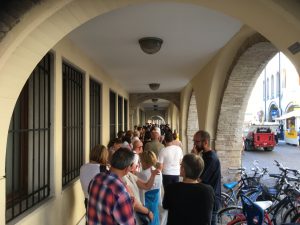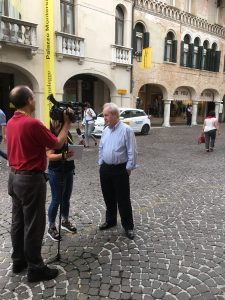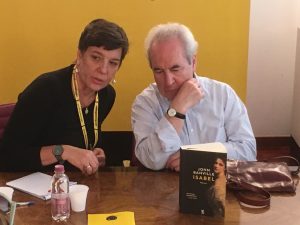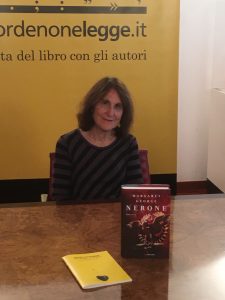Each year the small town of Pordenone, in northeastern Italy, hosts a book festival. It’s called “Pordenone Legge” (Pordenone Reads). It just ended on September 23rd and and I was fortunate enough to visit on two of the five days of the event. Let me tell you about my experience the first day.
But first, a little bit about this festival. The town of Pordenone has a population of around 50,000. During the festival this year, an estimated 250,000 came to visit. The event is divided into various themes, which include Children’s Books, Travel Books, Art and Architecture, Current Events, Science, Philosophy, History and more. Huge tents are built where thousands of books are for sale, each day tens of thousands of people wander the charming streets in search of their favorite author.
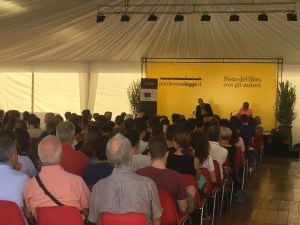
Authors speak to the public from multiple venues ranging in size from a few hundred to a few thousand.
Authors from all over the world come to speak to the public about their latest work (generally they are talking about a book that has just been released in Italy). Those presentation venues range in audience size from 150 to 3,000. In the ten years I have participated in this festival, I have rarely seen a venue that was not completely full. I love it.
And just to give you an idea of how this small town book festival is growing in stature, in 2013 there were 263 authors present. This year there were 600. And I am not talking about authors like me who few have ever heard of. Most of those invited to present here are famous, established, well-respected and successful masters of the craft.
All of this happens in the historic downtown of Pordenone, sometimes in centuries-old palaces, sometimes right on the street. It is a very cool book festival.
Here are the authors I met on Saturday.
Irish born Banville is a novelist, screenwriter and teacher. He was awarded the Booker Prize (UK equivalent to the Puliltzer) for “The Sea” in 2005. This year, he was presenting his latest work called “Isabel” in Italian where the English title is “Mrs. Osmond”. It is a sequel to the Henry James masterpiece “Portrait of a Lady.” I sat at a press conference when Banville was here in 2013 to present his work “Ancient Light” and found him interesting and with his dry wit, very entertaining. I am happy to say my impression has not changed.
Here are a few of the gems he shared with the small group of journalists who sat with him at his press conference this year.
Social phenomenon come and go but the essentials of life remain the same. As a novelist I believe art must be permanent, even if it reflects those current phenomenon.
Writing about current events is for journalists, not novelists.
A happy ending is not how life goes, so books should end with some ambiguity.
I write novels but am not very good at ideas.
You can see he is a serious writer who does not take himself too seriously. A pretty good lesson for all of us, I think.
American Elizabeth McKenzie is the senior editor of the Chicago Quarterly Review, a terrific independent literary journal. Her book “The Portable Veblen” published in English in 2016 has been translated to Italian under the title “L’amore nel Tempo degli Scoiattoli” which translates to “Love in the Time of Squirrels.” It is a strange and original story about finding the source of our actions and attitudes while struggling to mesh our beliefs with the world around us.
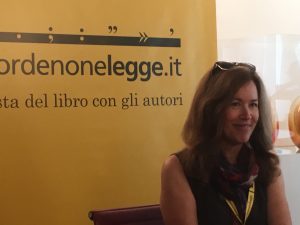
Elizabeth McKenzie at the start of her press conference. 600 authors participated at the book festival this year.
She had some interesting things to share at her press conference.
We thrive creatively by facing difficulty.
Writing can be a way of getting revenge.
If you have something you are angry about, that’s the start of your novel.
I confess I do not entirely agree with her on any of those observations, but her background and life experiences are clearly very different than mine. Nonetheless, this book is definitely worth reading.
Margaret George is an American historical novelist who specializes in epic fictional biographies. Her incredibly well-researched works include “Elizabeth I,” “Mary, Called Magdalene,” “The Autobiography of Henry VIII: WIth Notes By His Fool, Will Somers” and others. Each is a unique look at her protagonist, steeped in detail and written in a style that brings her subject back to life. She was presenting the Italian version of her “Confessions of Young Nero.” The sequel to that will be released in the US on November 6, called “The Splendor Before the Dark.”
She is keen to debunk the myths about Nero whom pretty much everyone pictures playing his violin as Rome burned around him. That image is completely false and she presents him as a brilliant and complex figure who has been maligned by history. I believe her as she talked about how thoroughly she researched her subject before writing more than 900 pages (the two books combined) in an effort to tell the story more accurately.
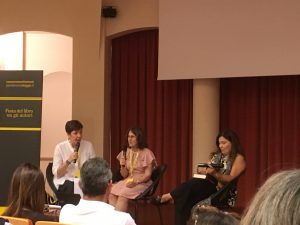
With help from a interpreter (left) and a moderator (right), Margaret George presents her first “Nero” novel to the Italian public.
On that note, as I am working on a historical biography, I asked how she avoids becoming paralyzed by too much research. Her answer was that she follows a set rule: the first half of her work is research, the second half is writing. She gave me some tips on how, as research is gathered, to catalog things so the writing part flows more easily. I wish I had met her about five years ago when my research started, but not to worry, I am well on my way writing now!
English novelist Robert Harris was a journalist before taking up novels. Some of his work is pure fiction (I recently finished “Conclave” which was excellent) and others are fictional accounts of historic events. That is the case in the book he was presenting, “Munich.” It is set in the Munich Conference of 1938 in which British Prime Minister Neville Chamberlain met in secret with Adolph Hitler in what was probably the first example of shuttle diplomacy. As an aside, I met Harris on September 22, the 80th anniversary of that conference.
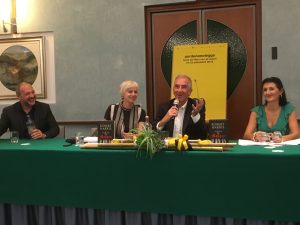
Novelist Robert Harris, with an interpreter, talks at his press conference. After, he signed my copy of “Conclave.”
He had worked for BBC and helped make a documentary on the 40th anniversary of that event, so confesses it has been something of an obsession with him.
Ideas he shared:
History gives you the facts, historical fiction tells you the story.
Do we learn from history? Maybe, maybe not. But unfortunately we do not learn to not make mistakes.
We are clearly living in a revolutionary time today. A full-blown cyber war is going on yet many do not recognize it.
Coming soon is Part 2, where I met novelist Lisa Halliday and former Obama speechwriter David Litt.



